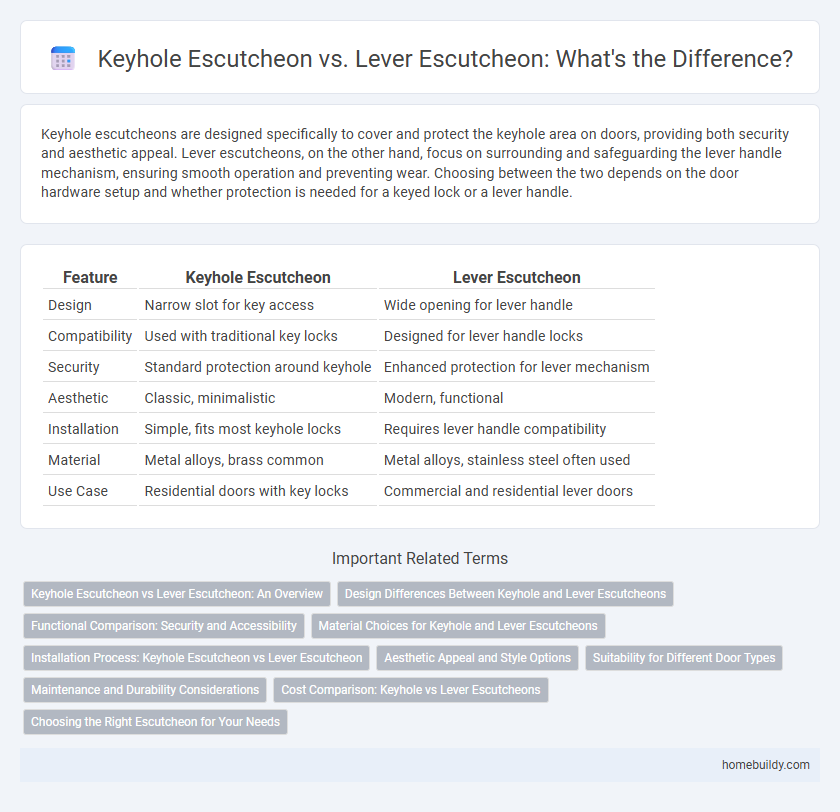Keyhole escutcheons are designed specifically to cover and protect the keyhole area on doors, providing both security and aesthetic appeal. Lever escutcheons, on the other hand, focus on surrounding and safeguarding the lever handle mechanism, ensuring smooth operation and preventing wear. Choosing between the two depends on the door hardware setup and whether protection is needed for a keyed lock or a lever handle.
Table of Comparison
| Feature | Keyhole Escutcheon | Lever Escutcheon |
|---|---|---|
| Design | Narrow slot for key access | Wide opening for lever handle |
| Compatibility | Used with traditional key locks | Designed for lever handle locks |
| Security | Standard protection around keyhole | Enhanced protection for lever mechanism |
| Aesthetic | Classic, minimalistic | Modern, functional |
| Installation | Simple, fits most keyhole locks | Requires lever handle compatibility |
| Material | Metal alloys, brass common | Metal alloys, stainless steel often used |
| Use Case | Residential doors with key locks | Commercial and residential lever doors |
Keyhole Escutcheon vs Lever Escutcheon: An Overview
Keyhole escutcheons provide a traditional and discreet cover for keyholes, enhancing security by protecting the lock mechanism from tampering and dust. Lever escutcheons, designed primarily for lever handles, offer ergonomic grip and aesthetic versatility but do not cover keyholes directly. Comparing both, keyhole escutcheons excel in securing and concealing key access points, while lever escutcheons prioritize handle functionality and design integration.
Design Differences Between Keyhole and Lever Escutcheons
Keyhole escutcheons feature a narrow, vertical slot designed specifically for traditional key access, emphasizing a minimalist, classic aesthetic that complements vintage or rustic door styles. Lever escutcheons are shaped to accommodate a lever handle mechanism, often incorporating broader, ergonomic designs with additional structural support to facilitate lever operation. The keyhole escutcheon prioritizes security and simplicity, while the lever escutcheon focuses on user convenience and modern functional design enhancements.
Functional Comparison: Security and Accessibility
Keyhole escutcheons provide enhanced security by fitting tightly around traditional keyholes, reducing tampering risks and preventing lock manipulation. Lever escutcheons offer superior accessibility with ergonomic designs that facilitate easier handle operation and accommodate users with limited dexterity. While keyhole escutcheons emphasize theft deterrence, lever escutcheons prioritize user convenience and compliance with accessibility standards such as ADA.
Material Choices for Keyhole and Lever Escutcheons
Keyhole escutcheons are commonly crafted from durable metals such as brass, stainless steel, and zinc alloy, chosen for their strength and resistance to wear, ensuring long-lasting protection around keyholes. Lever escutcheons often utilize similar materials but may incorporate additional finishes like chrome or satin to complement lever handles and enhance aesthetic appeal. Material selection for both types prioritizes corrosion resistance and compatibility with the locking mechanism to maintain both functionality and design integrity.
Installation Process: Keyhole Escutcheon vs Lever Escutcheon
Keyhole escutcheons require precise alignment with the keyhole to ensure smooth lock operation, often involving more detailed measurements during installation. Lever escutcheons typically offer easier installation with sliding or snap-fit mechanisms, reducing installation time and complexity. Proper fitting of either escutcheon type is crucial for optimal lock security and durability.
Aesthetic Appeal and Style Options
Keyhole escutcheons offer a classic and vintage aesthetic, often crafted from brass or antique-finished metals that complement traditional and rustic decor styles. Lever escutcheons provide a modern, streamlined look with a variety of shapes and finishes, such as chrome, matte black, and satin nickel, catering to contemporary interior designs. Selecting between keyhole and lever escutcheons largely depends on the desired visual impact, where keyhole styles emphasize historical charm, and lever styles prioritize sleek minimalism.
Suitability for Different Door Types
Keyhole escutcheons are ideal for doors that require traditional key access, such as interior wooden doors and vintage cabinetry, offering precise alignment with skeleton keys. Lever escutcheons suit modern doors with lever handles, commonly found in commercial buildings and contemporary residential spaces, providing ergonomic operation and compatibility with cylindrical locksets. The choice depends on door thickness, locking mechanism, and aesthetic preferences, with keyhole escutcheons enhancing classic designs and lever escutcheons delivering functional ease for frequently used doors.
Maintenance and Durability Considerations
Keyhole escutcheons typically require less frequent maintenance compared to lever escutcheons due to their simpler design and fewer moving parts. Durability is enhanced by the robust construction materials often used for keyhole escutcheons, such as brass or stainless steel, which resist wear and corrosion over time. Lever escutcheons, while offering ergonomic benefits, may experience more wear on internal components, necessitating periodic lubrication and potential part replacement to maintain optimal functionality.
Cost Comparison: Keyhole vs Lever Escutcheons
Keyhole escutcheons typically offer a lower cost compared to lever escutcheons due to simpler design and manufacturing processes. Lever escutcheons incorporate more complex mechanisms, driving up material and production expenses. Budget-conscious projects often favor keyhole escutcheons for their affordability without compromising essential functionality.
Choosing the Right Escutcheon for Your Needs
Keyhole escutcheons offer a classic design ideal for traditional lock cylinders, providing precise key alignment and enhanced security against tampering. Lever escutcheons are better suited for modern lever locks, ensuring smooth operation and protection from wear around the handle mechanism. Choosing the right escutcheon depends on the lock type, aesthetic preference, and functional requirements of your door hardware system.
Keyhole escutcheon vs Lever escutcheon Infographic

 homebuildy.com
homebuildy.com